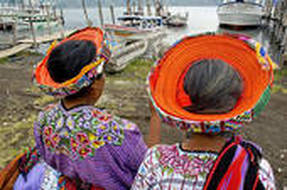
Author: JC Gardner
Title: Be a Force in Your Community
I had the incredible opportunity to go high into the mountains with a nonprofit group to visit the indigenous communities of Huehuetenango (pronounced Way-way-te-nango), Guatemala. The higher we climbed the less smooth the road became. The roads on the mountain gave a new meaning to “pothole.” These were craters with rocks, gravel, mud and a dog or two to get in your way. Our 4x4 pulled double duty as our experienced driver used every maneuver in the book to ensure we didn’t get stuck in a hole or go flying off the side of a curve for a Thelma and Louise type ending. (By the way, there were no guardrails or fences and most of the road was wide enough for just one SUV.)
Up in the mountains are a forgotten people, totally reminiscent of the Old West. The yards are occupied with cows, chickens, sheep, goats, and people on horseback. There are outhouses, 20X20 cement houses, stoves that need wood in order to cook and kitchen sinks located outside several feet away from the house. Meat hung in a few doorways for sale, along with Pepsi products piled into a makeshift store. Corn grew in unimaginable places. Women trotted up and down the mountain with stacks of firewood on their backs or large baskets on their heads while wearing their traditional dress. Young girls (under the age of eight) cared for infants and toddlers. Upon my arrival, indeed it was a strange sight. In a community where the tallest person may have been five-foot-five, I was a giant among men, standing tall at five-foot-ten. In addition to being a Black sister with cornrows, I became a spectacle with the kids, who all pointed, giggled and laughed at the strange sight. Can’t say that I blamed them!
Their hospitality was overwhelming. The indigenous people welcomed us into their community like new found family members. The whole village came out to greet us with handshakes, bouquets of flowers, and then we sat with them to enjoy a hot meal. Their simple lifestyle was mostly by choice, yet they were full of joy. I marveled at their resistance to move into the millennium.
These communities were far from perfect. Women were still in the shadows, waiting for the men to finish so they could eat what was left; families were abandoned by the man of the house who migrated to the United States for a better life; and the same social issues that plagued our communities were also in Huehuetenango.
When the meal was done, we met with the male leaders to listen to their needs. In my mind, I had anticipated their requests. Surely they would want indoor plumbing; an addition to existing housing would probably be another request, along with a few furniture pieces. As it was, several people lived together in a small space with floor mats as beds. Instead of the children’s feet being covered in shoes, they were mostly covered in dirt, so I started to brainstorm internally on a clothing drive.
They asked for none of these things. The help they sought was to improve the existing school building for the children and to have a decent medical center for the community. They did not want us to build these things; they just needed some funding, as they were quite capable and skilled to do it themselves.
On my way home, I reflected on why I was so out of touch about their needs. It was because my thought process was really about what I would need. We in the U.S. are so fortunate with our five dollar cups of coffee, hundred dollar sneakers, clean water, affordable housing, free education, a democratic society and the many other blessings that have been bestowed upon us.
Their needs were about the community, about the village, about what would serve everybody’s best interest. Some of us have lived in the same neighborhood for years but don’t even know the name of the person who lives next door for fear of them gettin’ in our bizness! We often think of ourselves first before what would serve the common good – what would serve the community; that is, of course, until something happens to disrupt our idyllic, privileged lifestyle.
I now strive to see outside of myself and limit my preconceived notions. Just because a community appears to have less than me doesn’t mean they are suffering or lacking. What I witnessed through their generosity was a resilient spirit that may have been bruised but it was not broken. When I watched the children playing, I saw happiness on their faces. When I broke bread with them, I didn’t feel like an outsider. They were thankful and happily shared what little they had. And they were full of joy.
 RSS Feed
RSS Feed
